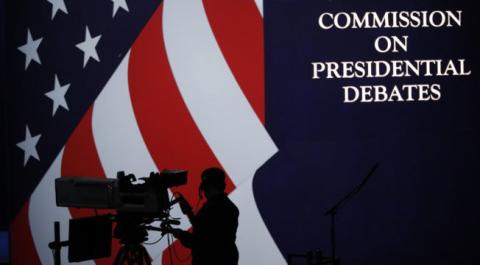The FEC wants a federal judge to throw out a second complaint against the Commission on Presidential Debates. The commission filed a motion to dismiss Level the Playing Field's (LPF) supplemental complaint on Tuesday, July 25.
LPF argues that the FEC continues to ignore a "mountain of evidence" that the debate commission is violating federal law with rules that explicitly favor the Republican and Democratic Parties by preventing competing parties and outside candidates from appearing on the presidential debate stage.
Further, LPF challenges the nonpartisan status of the debate commission as members of its board, including its co-chairs, have a financial and political investment in the major parties. IVN.us has covered this bipartisan agenda extensively.
ALSO READ: Debate Commission Co-Chairs Cross Ethical Line with Political Donations
In its supplemental complaint, filed on May 26, LPF requested the following from the court:
- Declare that the FEC’s dismissals of their administrative complaints were once again “arbitrary, capricious, an abuse of discretion, and otherwise contrary to law.”
- Order the FEC to find within 30 days that the CPD violated federal law “by staging candidate debates in a partisan manner and without pre-established, objective criteria.”
- Further order the FEC to find that the CPD violated federal law “by making prohibited contributions and expenditures,” and “by failing to register as a political committee and by failing to make required reports and disclosures.”
- Authorize plaintiffs to take civil action “against the CPD, its executive director, and the directors who have participated in these violations of federal election law,” if the FEC fails to act.
- Order the FEC to “revise its rules governing presidential debates to ensure that debate sponsors do not unfairly exclude independent and third-party candidates from participating.”
The FEC argues that since Level the Playing Field is not a political party and gives no guarantee that it will run or back a candidate in 2020, it has no “competitor standing” to challenge the commission's policymaking.
Further, and absurdly, the FEC says LPF alleges that the rules being challenged affect their ability to fundraise, yet fundraising isn’t the mission of LPF. Therefore, the commission argues, there is no “relative diminution” of LPF’s “political voice.”
Just think about that argument for a second and ask, what political organization has a primary purpose to fundraise? Isn’t fundraising simply a necessary component that every organization needs to engage in, in order to advance the primary mission?
“Gas is not the primary purpose of driving a car, so having no gas doesn’t affect your ability to drive,” the FEC seems to suggest.
Fact is, there is little to no incentive for an independent to launch a presidential campaign unless the rules are changed.
It would cost an independent candidate exponentially more money to gain the same visibility as a major party candidate -- hundreds of millions of dollars -- and even then the odds are heavily stacked against him or her.
"If these rules are not changed, we might as well write into the Constitution that only Republicans and Democrats can be president," says LPF Chairman Peter Ackerman.
Third party and independent candidates have to deal with significant institutional and legal barriers put in place by the Republican and Democratic Parties that make it impossible to get to the 15% polling threshold needed to get into the debates.
These include restrictive primary, ballot access, and campaign finance laws that kill outside competition before it can emerge.
"Without participating in one of the two parties’ private nomination processes, a candidate cannot realistically qualify for the presidential debates," writes Independent Voter Project Attorney Chad Peace in an amicus brief filed in support of the lawsuit.
Peace added, "And without entrance into the presidential debates, no candidate can challenge the nominees of the two parties in the competition of ideas and governmental policies."
Without action from the court to undo rules designed to protect Republican and Democratic candidates from outside competition, the two parties will maintain a monopoly over the entire public election process.
In this case, it appears that the FEC is trying to end the lawsuit against the debate commission by arguing that LPF does not have standing to sue because, unlike the two major political parties, they are not certain to put forward candidates in 2020.
In short, the FEC presents a ‘Chicken v. Egg’ question that LPF has explained ad nauseum: unless the rules change, LPF will not be able to convince independent candidates to run.
In the latest Motion to Dismiss, the FEC plays chicken.
Read the FEC's motion to dismiss:
Read LPF's Supplemental Complaint:
Read Independent Voter Project's Amicus Brief:
